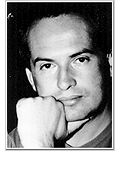| Distributed by CroatianWorld Croatian Stories UNBROKEN RED LINES
- JosipNovakovich - I don't have enough breath to tell smoothly. I don't know where my drawing of breath should take place, and where the lines should be breathless and broken. Never mind: this unsyncopated verselessness does not seek artfulness of expression, but is as simple a lament as possible. Well, in Cleveland there is a man, who came here some forty years ago. He had first worked since his early teens as a grocery store assistant in a Jewish merchant's store in Sarajevo. The war came. Djeba's boss hid from the Nazis, and Djeba was drafted at gunpoint by the Nazis into the Croatia army. The army was defeated, and it surrendered to the British in Slovenia, under the promises of some kind of amnesty. The British passed the POWs on to Tito's partisans, who strafed the company, which huddled together. The POWs didn't have the place to fall on the ground, and many corpses remained standing. Djeba, unhit, curled down below the mess of bleeding corpses, inhaling urine and blood. When you are hanged, you have an erection. When you are struck down, or before it, you piss. And then bleed. The standing corpses fell like dominos, piling up in two-three floors. At the bottom, Djeba didn't dare to move from under the mound of corpses for hours, but when he nearly suffocated, he crawled from under the foul flesh. Hiding, he chose the most difficult mountains to go back to Bosnia, where he lived in the woods and in a cave for two years, in fear that the partisans might still execute him. He ate tree roots, wild onions, berries, frogs. Still, driven by hunger in the winter he walked over the same mountain ridges to Slovenia and Austria, and reached a refugee camp. He looked for his former boss from Sarajevo in Vienna and found him. The former boss, a survivor of harrows himself, took his former grocery boy, under his wings. Djeba worked in the survivor's new grocery store. Got a visa to the States. Worked for the Tick and Screw Company and in Cleveland on bread and water. He saved enough money to buy books. He opened a bookstore, the only Croatian bookstore on the North American Continent, on St. Claire and 62nd. Yugoslav secret agents demolished his store several times and threatened to kill him. He repaired the store, and kept selling books in Croatian, so the word would not die out, so the people would not die out. The first time I got to the States, my Slovene grandmother took me to the store, in 1974, and there I met the man and his books. She bought me a large dictionary in red covers. My grandmother, who was a partisan nurse in Croatia and Slovenia in the war, died. She is buried in the Calvary cemetery, with her bachelor brother, who joined her in Cleveland, so they could die together. That may not have been the plan, but they died two weeks apart, and ended up in a singular grave. I have visited Cleveland many times, and each time I stop by in this bookstore. The Croatian, Slovenian, and Hungarian neighborhood on the east side fell apart. It became inner-city black. Out of racism or fear, whites in general fled to the suburbia. Slovenes and Croats were the last to follow, perhaps not because of the lack of phobia and racism, but because of poverty, and there are still many of them in that neighborhood, including the bookstore man, Djeba. He does not hate, he does not fear, he sells books. His brother died. His sister died. He is alone. I visited him several months ago. He showed me how he grows his flower garden. He waters the red flowers lovingly. He showed me how he eats. A bit of bread with olive oil and half an onion and several lettuce leaves. He was eighty five. We could not talk much. He was nearly deaf. His eyes, cataract ringed, looked steadily, and he nodded often. Tako je to, he kept saying. That is how it is. After my visit, a young man robbed him. Knocked him down on the floor. Kicked him and broke his ribs. Smashed his face. Took his wallet. The man who had got up from under the mound of foul corpses in the last world war, didn't get up. Was found by his friend, a librarian. Taken to thehospital. He recovered in a month, and went back to the bookstore. He still runs it. He is not moving to the suburbia. He loves his neighborhood, his books, his language. Do I love books that much? Who does? And there he is, exposed, old, deaf, nearly blind, with his books of beautiful islands and ugly histories. Anybody can walk in and knock him down. But so far he is still standing. Next time I go to Cleveland, I will buy one old yellowing novel and a jar of red ajvar: red tomatoes mixed with red peppers. We will sit down and drink mineral water from Croatia, and he will say, Tako je to. But, is there the next time?

Josip Novakovich
josipn@yahoo.com
|